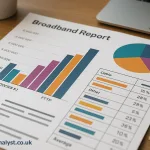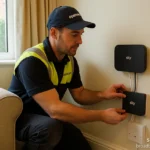Virgin Media O2 has released new research showing that millions of older people in the UK have fallen victim to online scams in the past year. The company says it wants to raise awareness of the risks and help people protect themselves through a new series of community workshops called Scam Schools.

1.8 million older people affected
According to a survey carried out by Censuswide for Virgin Media O2, more than 1.8 million people over the age of 65 in the UK were scammed online in the past 12 months. The average reported financial loss was around £831 per victim.
The polling included just over 3,000 respondents, of which about one-third were aged 65 and over. More than half of participants said they worried that elderly family members could lose their life savings to fraud. A large share admitted they were not confident their relatives could spot a scam message.
Common scams targeting older users
Scams are becoming increasingly convincing, with many mimicking genuine services. Some of the most common tactics currently circulating include:
- Texts or emails claiming to be from banks or HMRC, warning of unusual activity.
- Fake winter fuel or pension allowance notifications, pressuring people to click links and submit details.
- Investment and pension offers promising high returns, often spread on WhatsApp groups.
- Missed-parcel messages from couriers, directing people to fraudulent websites.
- Impersonation scams where criminals pose as children or grandchildren with a “new number” request.
These types of attacks prey on trust, urgency, and financial vulnerability, which can make older people more susceptible.
Scam Schools: free training across the UK
In response, Virgin Media O2 has partnered with the Good Things Foundation to run Scam School workshops across the country. The free sessions will give people practical advice on spotting fraudulent texts, emails, and calls, and help them build the confidence to use the internet more safely.
The initiative ties in with Get Online Week, which takes place later in October. While only a handful of events have been confirmed so far, they cover cities including Birmingham, Lewisham, Liverpool, Reading, and Manchester. Those who cannot attend in person will be able to access a free online course via the Learn My Way platform.
Why families are worried
The research shows that fear of being scammed is changing how older people use the internet. Around 40 percent of respondents said that anxiety about fraud stops their relatives from enjoying online activities like shopping or banking. Nearly one-third have even advised older family members to avoid going online altogether.
Many younger family members are also stepping in to handle tasks such as online banking, paying household bills, or booking appointments on behalf of parents and grandparents. While this provides some reassurance, it also highlights how scams can reduce independence and confidence for older users.
Fraud in the wider UK context
The problem is not limited to one provider or platform. UK Finance figures show fraud losses remain close to £1 billion a year, with millions of cases reported across the country. A significant share comes from authorised push-payment fraud, where victims are tricked into transferring money themselves.
New rules introduced in late 2024 require banks to reimburse many victims of these scams, but prevention is still critical. Criminals continue to find ways around security measures, from one-time passcode interception to fake “tech support” calls.
How the UK compares globally
The UK is considered one of the most targeted markets for online fraud. English-language reach, widespread digital banking, and rapid adoption of faster payment services make it attractive to criminals. Other countries face similar threats, but the combination of high internet penetration and reliance on online transactions leaves the UK particularly exposed.
How to avoid online scams
Experts say there are a few basic steps that can help keep people safe online:
- Do not click on links in unsolicited emails or texts. If a message claims to be from your bank, HMRC, or a delivery firm, visit the official website directly instead.
- Report suspicious texts by forwarding them to 7726 (a free service used by all major mobile networks). Scam emails can be reported to the National Cyber Security Centre.
- Never share one-time passcodes or install remote access software if someone calls claiming to be from your bank or a tech support service.
- Be cautious of investment offers that sound too good to be true. Legitimate financial services do not promise guaranteed monthly returns.
- Always double-check with family before sending money if you receive a sudden message claiming to be from them.
Virgin Media O2’s role
Virgin Media O2 says it is already blocking millions of fraudulent texts before they reach customers. The Scam School programme is the latest step in its efforts to build confidence among older users and give families the tools to help their relatives stay connected without fear.
The company acknowledges that scams evolve quickly and can fool anyone, but stresses that education and awareness are key to reducing the impact.
Future steps
Only a small number of Scam School events have been scheduled so far, but the organisers say more sessions will be announced in future. Families who want to get involved can check the Good Things Foundation website or the Virgin Media O2 news pages for updates.
For older people, the challenge is clear: the internet brings convenience, access to services, and social connections, but scams are an unavoidable risk. Programmes like Scam School could help bridge that gap, ensuring that confidence grows alongside connectivity.









